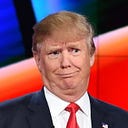Day -7: Obama Kicked Putin’s Ass for Eight Years
The real reasons behind why Putin wanted Donald Trump and no part of Hillary Clinton
Vladimir Putin, by way of president or prime minister, has led Russia in essentially the same capacity for nearly two decades. While Russia thrived under George W. Bush, the same cannot be said for the Eastern European nation since President Barack Obama took office.
In the last eight years, Obama has pushed Russia from a world power to a regional power.
Since 2008, Russia’s per-capita GDP has dropped by 33 percent. In comparison, the United States’ per-capita GDP has risen by nearly 25 percent.
This, among other failings, has led Putin to take on the strategy of the ancient famous Chinese military general Sun Tzu:
“Appear weak when you are strong, and strong when you are weak.”
Putin has done exactly that: invading Crimea, getting involved in Syria and making general threats toward the U.S. and the West as a whole. This has largely worked for both Putin’s approval ratings at home and the perception of Putin by Republicans in the United States.
As for the perception in his homeland, the Washington Post aptly summarized Putin’s approval ratings:
“Just over two years ago, as Russia headed toward the Winter Olympics in Sochi, Putin’s poll numbers were slumping. Only 61 percent of Russians approved of his job performance — high by Western standards, but the lowest for Putin since shortly after he took office. After Putin annexed Ukraine’s Crimean Peninsula, then stoked tensions with the West to their worst since the Cold War, Russians took their minds off their struggling economy and positioned themselves resolutely behind their leader.”
In the U.S., Putin’s strong rhetoric, accompanied by an extremely partisan environment, has garnered him support from a group that used to despise him. Putin’s favorability has seen a net increase of 56 percentage points in just two and a half years from Republicans. Democrats, however, continue to view Putin severely unfavorably.
The ruble, compared to the dollar, has gotten crushed, as well.
When Obama took office, the ruble to dollar exchange rate sat at about 35:1. Today, that figure is right around 60:1. In other words, the ruble has about half of the purchasing power, compared to the dollar, that it had when Obama was elected.
Inflation has crushed Russia’s ability to compete on the global scale, as they’re constantly getting squeezed on each side by the strong American dollar and China’s low cost goods.
Unsurprisingly, the world’s worst-performing major currency in 2016? The ruble.
Russia’s main export, fossil fuels, are going the way of the dodo bird. As the world becomes less dependent on fossil fuels through utilization of clean energy and increased efficiency, Russia continues to get pushed to the brink of economic collapse.
Couple all of that with the fact that Russia has to support a population that is ninth-largest in the world but is substantially dependent on importing a shockingly high number of goods that they should be able to produce themselves, and the economic outlook for Russia is quite poor.
Obama, in pushing for more clean energy, often was mocked by many Republicans in both Congress and the public as a whole. However, the effect has been multi-pronged: reducing both greenhouse emissions and the global demand on foreign oil, as well as adversely affecting some of the U.S.’s largest geopolitical rivals, including Russia.
Obama has capitalized on long-term strategy and brains over brawn in neutralizing the proliferation of Russian strength.
The economic sanctions imposed in 2014 against Russia have further crippled their ability to grow their economy.
All of this leads directly back to Putin and Russia’s obsession with the U.S. election.
Putin greatly feared a Hillary Clinton presidency. Clinton was expected to follow many of Obama’s policies. She was, however, expected to be even more hawkish in her strategy in eliminating Russia’s showing of military strength. When Obama sought a diplomatic reset of sorts between the nations, Clinton, as secretary of state, expressed considerable skepticism that any reset would be effective. She was correct.
Trump, on the other hand, appeared amenable to many of Putin’s goals and objectives. Trump did not speak out against Russia’s annexation of Crimea, indicated a willingness to remove economic sanctions, and has not been nearly as combative in interfering with Russian military involvement in Syria, or other.
On top of that, Putin sees Trump for what he is: a diplomatic novice who hurts the U.S.’s credibility and can be manipulated or even blackmailed. More importantly, Trump gives Putin a chance to bring Russia back to the table as a world power.
Obama has been criticized by some for appearing weak on Russia, while Putin has gotten credit for appearing strong.
But heed the wisdom of Sun Tzu.
With a decidedly pro-Russia political platform and Cabinet nominees, Trump is attempting to reach out and help Russia off its knees.
Obama put them there.
-7 days in, 1468 to go
Follow us on Twitter @TrumpTimer
